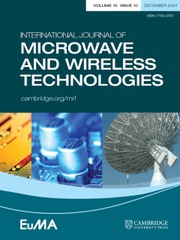No CrossRef data available.
Wideband and wide-angle flat Radomes using dielectric and ferrite layers
Published online by Cambridge University Press: 12 April 2012
Abstract
A new structure is proposed in this article, to operate as wideband and wide-angle flat Radome. In this structure several dielectric and ferrite layers are placed successively, one next to the other, to behave as a matched layer. First, the relationship between the permittivity and permeability of a required fictitious mixed material is obtained. Then the required permittivity and permeability of dielectric and ferrite layers are obtained at desired incidence angle. The performance of the proposed structure is investigated and validated using some theoretical and simulation examples.
Keywords
- Type
- Research Papers
- Information
- International Journal of Microwave and Wireless Technologies , Volume 4 , Issue 5 , October 2012 , pp. 529 - 535
- Copyright
- Copyright © Cambridge University Press and the European Microwave Association 2012


